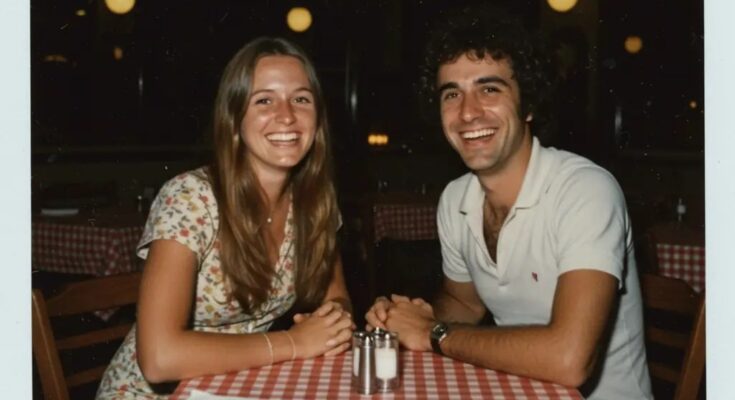I had never liked the attic. As a child, I’d always run past the narrow staircase leading up there, convinced that something might reach out and grab my ankle.
The space smelled like dust, like winter, and like everything unsaid. The attic felt like it held secrets, its silence thick with memories and things left unspoken.
But after Mom passed, something changed. Her voice was no longer in the kitchen, and her slippers weren’t by the door. Yet, upstairs—where the air was still and quiet—her presence lingered. I couldn’t explain it, but it called to me, pulling me toward that forgotten space.
Maybe it was the way the floorboards creaked under my feet, almost like footsteps following me.
Maybe it was the light slanting through the old wooden slats, casting dust into the air like whispers of the past.
I climbed the stairs slowly, gripping the railing tightly, afraid it might fall apart at any moment. The air at the top of the stairs was cooler, and the floor creaked under my weight as I stepped forward. Nothing had changed in the attic. It still had the same piles of boxes, the same old rocking chair in the corner.
I sat down on the faded quilt that had once been hers, letting the familiar scent of her linger in the air. I closed my eyes for a moment, breathing her in, remembering her smile, the way she always smelled of lavender and fresh bread.
The closet was where she kept the things she couldn’t bear to part with.
I opened the old wooden door. The hinges groaned in protest, as if it hadn’t been touched in years. Inside, there were things I hadn’t seen since I was a child—my first drawing, yellowed and faded, crayon marks still visible through the creases.
A broken rosary hung from a nail, its beads scattered like forgotten tears on the shelf.
Next to it, an old pocketknife, worn and chipped, didn’t seem to belong to my dad.
And then, behind a stack of books, I found it. A shoebox. The edges were frayed, the cardboard worn, like it had been opened and closed a hundred times.
I set it down carefully on the floor and opened it. Inside, I found postcards, faded with age, the ink barely legible. The handwriting was old-fashioned, careful, as if the writer had poured his heart into every word.
There were photographs too. Black and wh!te, with edges curled from time. One photo caught my attention. It was of Mom with a man I didn’t recognize.
He had dark hair and a soft smile, his arm around her like he belonged there. But he wasn’t my father.
And then I saw the letter.
It was sealed, the envelope yellowed with age. There was no return address, just a single word written in cursive: Marrine.
My hands shook as I opened it, the paper crackling under my fingers.
“I’m sorry it took me so long…”
The words h!t me like ice-cold water. The handwriting was hurried, but it carried an intensity, as though every sentence was pulled from deep inside.
He wrote about her laugh. The way they’d lie on the hood of his car in the summer, talking about everything and nothing.
He wrote about their first kiss behind the high school gym.
And then he wrote, “I still wonder if she ever told you. I always hoped she would.”
My hands trembled as I reread the letter, the truth sinking in slowly, painfully.
He wasn’t just someone from her past. He was important. The man I had known as my father, Daven, wasn’t the one who had made me.
I wasn’t just mourning my mother anymore.
I was mourning the truth.
I didn’t sleep that night. I lay in bed, staring at the ceiling fan that spun lazily above me. The world outside was still, but my mind was anything but. It raced with questions and memories that I had never thought to ask.
Around 3 a.m., I sat up, flipping on the lamp. I pulled the box from the attic onto the bed and opened it again. I knew what I would find—more letters, more photos, each one a fragment of a life I didn’t know.
I traced the edges of the black-and-wh!te photos, my fingers trembling.
Most of the photos showed my mom smiling, some with friends, others alone. But in a few of them, there was a man beside her. Always the same man.
His name was Max, and I kept seeing it in the old birthday cards and letters in the box. Max. Over and over again. Like a name that wouldn’t go away.
My thoughts wandered to Mrs. Natasha, the neighbor who used to sit with my mom every Sunday afternoon. They’d sip iced tea and talk softly, sharing secrets I never got to hear.
The next morning, I drove to Mrs. Natasha’s house. She opened the door, looking like she had been expecting me. Her hair was still in soft curlers, and she wore an old pink robe.
“Sweetheart,” she said, pulling me into a hug, “grief makes us dig up more than graves.”
I blinked back tears, not ready to hear what she might say. “Do you remember someone named Max?” I asked quietly.
She didn’t respond immediately, her lips pressed together. After a moment, she nodded. “He was her first. And maybe her real one, too.”
“Why did she let him go?”
Mrs. Natasha sighed, then whispered, “Because she was already pregnant. And scared.”
The weight of her words h!t me like a brick. I placed my hand over my chest, trying to breathe.
“Do you know where he went?”
She paused, then disappeared into the kitchen. She returned with a torn grocery list and scribbled something on it. “Last I heard, he was living in a small town. Here’s the name,” she said, handing me the paper.
I took it like it was a map, knowing it was the key to the answers I had been searching for.
The town was small—so small it felt like I could blink and miss it. A single street ran through it, the heart of the place.
I asked around, slowly, nervously, until I found someone who knew him. At the post office, a woman with gray hair and bright eyes pointed me toward a wh!te bungalow at the end of Pine Street.
My heart raced as I drove there, past the quiet houses, each with its own secrets.
The wh!te bungalow was simple, yet well cared for. I parked and stood there for a moment, my hand hovering over the screen door.
I knocked. The door creaked open, and a man stood there. His face was lined, his eyes deep like the bark of a tree.
“You’re her daughter,” he said, more as a statement than a question.
I nodded. “Yes.”
He stepped aside and let me in.
The house was quiet, filled with the smell of old books and fresh coffee. He poured me a mug and set it in front of me with both hands, like it meant something.
“She never wrote back,” he said, his voice low. “But I kept hoping.”
I looked down at the mug, my heart heavy with the weight of the years.
“Why did you leave?” I asked quietly.
He stared out the window, his voice distant. “My brother got arrested. My father got sick. Life… it cornered me.”
“And Mom?” I pressed.
He turned to me then, his eyes soft. “I never stopped loving her. But when I came back, she was married. People said she was pregnant.”
I nodded. “She was. With me.”
He fell silent, then sighed. “I guess I didn’t come back fast enough.”
I left, my heart heavy but lighter than before. I drove home, parked in the driveway, and sat there for a while, just staring at the house.
Daven—my dad—was outside, fixing the screen door again. A small thing, but a steady thing.
He saw me and waved. “Hey, bug,” he said, wiping sweat from his forehead with the back of his hand.
I hadn’t heard that nickname in years. It h!t me harder than I expected. My throat tightened.
“Can we talk?” I asked.
He didn’t ask questions. He just nodded and came over to sit beside me.
I told him everything. The attic. The box. The letter. Max.
He didn’t flinch. Didn’t raise his voice. Just listened.
“There was a look in her eyes,” he said softly. “Like she was holding something back.”
I took his hand, warm and familiar. “You raised me. You’re my father.”
He looked at me, giving me a tired smile. “Bl00d is cheap, honey. Love costs more. And I paid it gladly.”
And just like that, the past stopped h@unting me. It didn’t disappear, but it softened.
Now, I keep that letter in my nightstand. Not as a wound, but as a reminder. Of love, lost and found. Of the truth that never left.
This is a journey of truth, loss, and the family that always stays by your side, even when the past refuses to stay buried.

